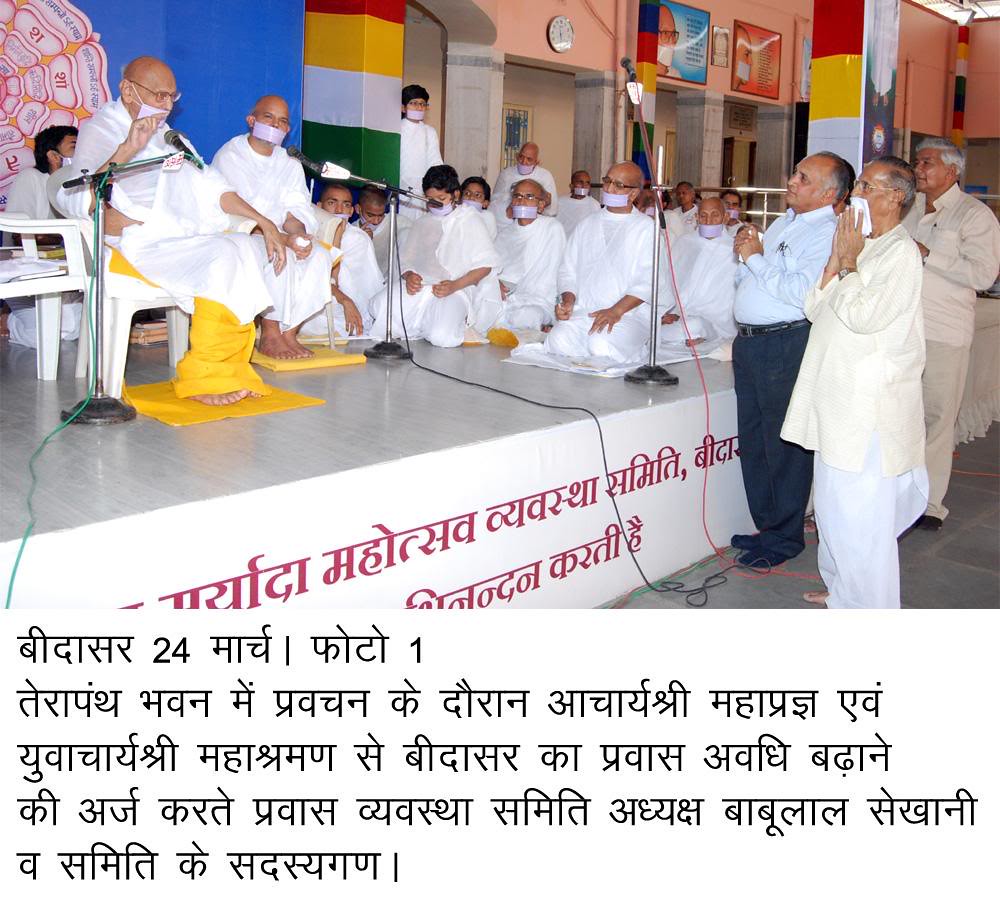JAIN VISHVA BHARATI UNIVERSITY

 Acharya Mahapragya Pravas Samiti 's president Shri Babulal Sekhani along with his team requesting Acharya Shri to extend his Bidasar stay
Acharya Mahapragya Pravas Samiti 's president Shri Babulal Sekhani along with his team requesting Acharya Shri to extend his Bidasar stay
New Model For Moral And Spiritual Progress
Jainism has got full ability to become a new model of Global ethics for moral and spiritual progress. The term 'moral' closely associated with ethics, comes from the Latin word 'mores' which primarily stands for 'custom' and 'habit' and secondarily means character. 1 The person who leads highly moral life is appreciated in his family, society, state and even in his country. He feels himself fully contented and happy. Moral values fulfill motto of individual's life. High moral fellow gets higher position in collective life. Modern scholars have also emphasized the super-moral nature of the ethical teachings of the Upanisads. Dr. Radhakrishnan, while discussing the ethics of Upanisads, remarked, "Duty is a means to the end of the highest perfection. Nothing can be satisfying short of this highest condition. Morality is valuable only as leading to it." 2 Custom and habit of individual can only be changed by purifying internal emotions. Positive emotions give rise to positive thoughts, which reflect good habit and custom of individual. Deussen has also very clearly pointed out this. He observes that when, "the knowledge of Atman has been gained, even action and, therefore, every moral action also has been deprived of meaning." 3
In the light of becoming a new model of global ethics for moral and spiritual progress Jainism says, "It is only after the acquisition of Samyaktva (spiritual conversion) that the soul attains the primary qualification for even marching towards emancipation from the wheel of misery. If mithyatva is the root of samsara, samyaktva is the root of moksa. Ethics does not deal with any particular conduct but with conduct in general. To gain right attitude, right vision, right faith is the gain of right conduct. As per Jainism "to gain happiness in life first of all one must gain samyaktva". All the conduct should be such as would bring us the maximum of happiness and remove miseries from our lives. Samyaktva can be obtained by gaining faith in nine fundamental elements of Jainism viz. Jiva (soul), Ajiva (matter), Punya (merit or virtue), Papa (sin or vice), Asrava (influx), samvara (stoppage), Nirjara (shedding of karmic matter), Bandha (bondage) and moksa (emancipation or salvation). Out of nine fundamental elements of Jaina philosophy, only two, the 'self' and the 'non-self' are dealt with from a metaphysical point of view; the other seven are mere corollaries of the problem of getting rid of miseries. Sarvadarsana Samgraha very beautifully summaries the position when it says, "Asrava (inflow of karmic matter causing misery) is the cause of mundane existence and samvara (stoppage of that inflow) is the cause of liberation: this is the Jaina view (in short), everything else is only its amplifications. 4
Jainism gives lesson to perform noble activities every moment. The person who believes in moral values must rise above good and bad actions. One should try to search truth himself or herself. Truth and valuation are inseparable. Metaphysics and ethics are the two sides of the same coin. To get rid of miseries and to achieve happiness in life one should lead balanced life. Jainism puts much emphasis on equality and equanimity. Prominent Jainacarya Kundakunda says that vice and virtue are shackles of iron and gold respectively, both of which bind us to the physical world. 5 This Jainism qualifies ability to become new model of moral and spiritual progress for Global Civilization.
New Model For Individual And Collective Life
Jaina philosophy inspires to lead peaceful individual happy life and harmonious collective life. One should be so disciplined that does not put any trouble to anybody in his daily life. The life of discipline in Jainism is prescribed in two forms: one, more rigorous for a monk who has severed his ties with the world, and the other, for a householder who has a number of social responsibilities. Jaina vows are: Ahimsa, Satya, Asteya, Brahamacarya and Aprigraha. These are called Anuvratas when prescribed for householder and Mahavratas when rigorously practiced by a monk.
Jaina philosophy has provided some formulas for leading efficient individual and collective life. Jainism says that dharma is made up of "nonviolence, self-control and austerity." 6 Ahimsa is so central in Jainism that it may be incontrovertibly called the beginning and the end of the Jaina religion. Thus he who is able to realize Ahimsa completely, though not perfectly is called an ascetic or a Muni, Householders and ascetics are the two wheels on which the cart of Jaina ethics discipline moves on quite smoothly. Anuvrata is the unique contribution of Jainism, which has got ability to become Global ethics.
The aim of individual and collective life is to achieve physical, mental and emotional perfect health. This triple health can only be obtained by doing virtuous deeds. One should never think bad of others. He should be always ready to help others and not to harm others. Samyagdarsana i.e. belief in Arhat, Acarya and Religion preached by Arhat should always be deep dived in brain and heart of individual. Acarya Samantabhadra proclaims that the adoration of Arhat deposits great heap of punya in the self. Positive emotions bring pleasures and negative emotions make life miserable. "Birth is misery, old age is misery and so are disease and death. 7 The main attraction "is a safe place in view of all, but difficult to approach, where there is no old age nor death, no pain nor disease." 8 "The transitory condition is like a wheel at a well before one bucketful of distress is got over a large number of afflictions overtake the soul. 9 Jainism believes in highly disciplined ethics so it has full capability to become new model for leading individual and collective happy and peaceful life.
New Model For International Order And Globalisation
Jain Philosophy can prove itself new model for International order and Globalisation. Man of today is living in a world, which is much more complex than that of an ancient or mediaeval man. Interdependence among nations has increased; and this has brought an even widening and deepening impact on the economics, intellectual and social conditions of our existence. The scientific advancement has made countries one another's neighbours. Divergent races, divergent cultures and divergent outlooks have come in close relations.
Non-violence should be declared as an international religion. Jainism practices non-violence very minutely as principle and conduct also. Non-violence is the heart of Jainism. All worldly problems can be solved by keeping non-violence in centre. The national and international activities should be guided by the principle of non-violence and Anekanta. In order that the country may function properly without encroaching upon the inherent spiritual nature of man, it must identify itself with samyagdarsana, samyagjnana and Samyagcaritra. The adoption and assimilation of Anekanta is samyagjnana. The resolute and astute application of the policy of non-violence and Anekanta in national and international spheres for solving all sorts of problems will credit the country with Samyagcaritra.
Individual is smallest unit of whole world. If the smallest unit is morally pure and owner of good conduct we can hope that whole world can be truthful and follower of Ahimsa. The principle of non-violence really implies that life should be elevated altogether from the plane of force to that of reason, persuasion, accommodation, tolerance and mutual service.10 The interrelations among different countries should be nourished upon truthfulness. Fraud or deception defiles the spirit of co-existence. The Jaina philosophy proves as new model of international order and globalisation.
New Model For Environmental Protection
Lord Mahavira defined, "Earth, water, fire, air, vegetables and small creatures all are animate". They have got souls and many times we have also taken birth in these vaginas. Environment consists of all these living organisms—earth, water, fire, air, vegetables and small creatures. Jain philosophy protects them and inspires for limited use of all these living things. Ethical discipline (acara dharma) is an important aspect of Jainism. The foundation of this ethical discipline is non-violence. No one has any right to destroy or harm any other living being. Every one wants to live and nobody wants to die. "The laying down of the commandment not to kill and not to damage is one of the greatest events" as rightly observed by Albert Schweitzer.11
For attainment of salvation Jainism puts much emphasis on triple jewels samyagdarsana, samyagjnana and samyagcaritra. Goal of individual's life is to achieve peace and happiness in life, which can only be achieved by good conduct. "As you sow, so shall you reap" is the most fundamental doctrine of Jaina ethical system. Man is the architect of his own fate. It is this belief, which holds him responsible for his own miseries and happiness. It is this belief again, which inspires him to ethical considerations in his conduct.
Passions like anger, ego, deceit and greed are the main causes of violence. We can protect Environment by reducing our greed i.e. by reducing our passions. Ego and attachment is cause of samsara. We should control both ego and attachment to lead happy and peaceful life. Jainism has prescribed different experiments and trainings to reduce ego and attachment. Without greed ego cannot take birth. By limiting greed we can save environment and their components earth, water, fire, air, vegetables and small creatures, which are all living beings as per Jaina philosophy.
Good activities are to be deemed as a means and not as an end in itself. Even the subtlest form of passion in the form of ego is to be swept away. The moral virtues should be observed with the ultimate end in view without a tinge of egoism. The transcendental morality is not an excuse for moral slackness. The enlightened rise above the ordinary duties of life is the awareness of a higher purpose of life. The ordinary man should fulfill his duties with a detached view.
Thus Jainism has non-violence and Anekanta such root fundamentals with the help of them it can prove itself new model of moral and spiritual progress, individual and collective life. International and Globalisation and Environmental protection. Jainism has full capability to become religion of public and of whole world. Jaina Philosophy has gone upto the subtlest application of non-violence in theory and practical both. In Jainism every action is weighted on the balance of non-violence, truth and Anekanta.
References:1 Muirhead, John H. The elements of Ethics, London, 1910, p. 4.
2 Radhakrishnan, S., Indian Philosophy, Vol. I, p. 208.
3 Deussen, Paul, The philosophy of Upanisads, Edinburgh, 1919, p. 362.
4 Sarvadarsana Samgraha, Poona, 1951, p. 80
5 Samayasara, Delhi, 1959, Gatha 146.
6
7 Uttaradhyayana, Gurgaon, 1954, 19.15
8 Ibid, 23.81.
9 Istopadesa, 12.
10 World problem and Jaina ethics, p. 9
 Prof. Dr. Sohan Raj Tater
Prof. Dr. Sohan Raj Tater
